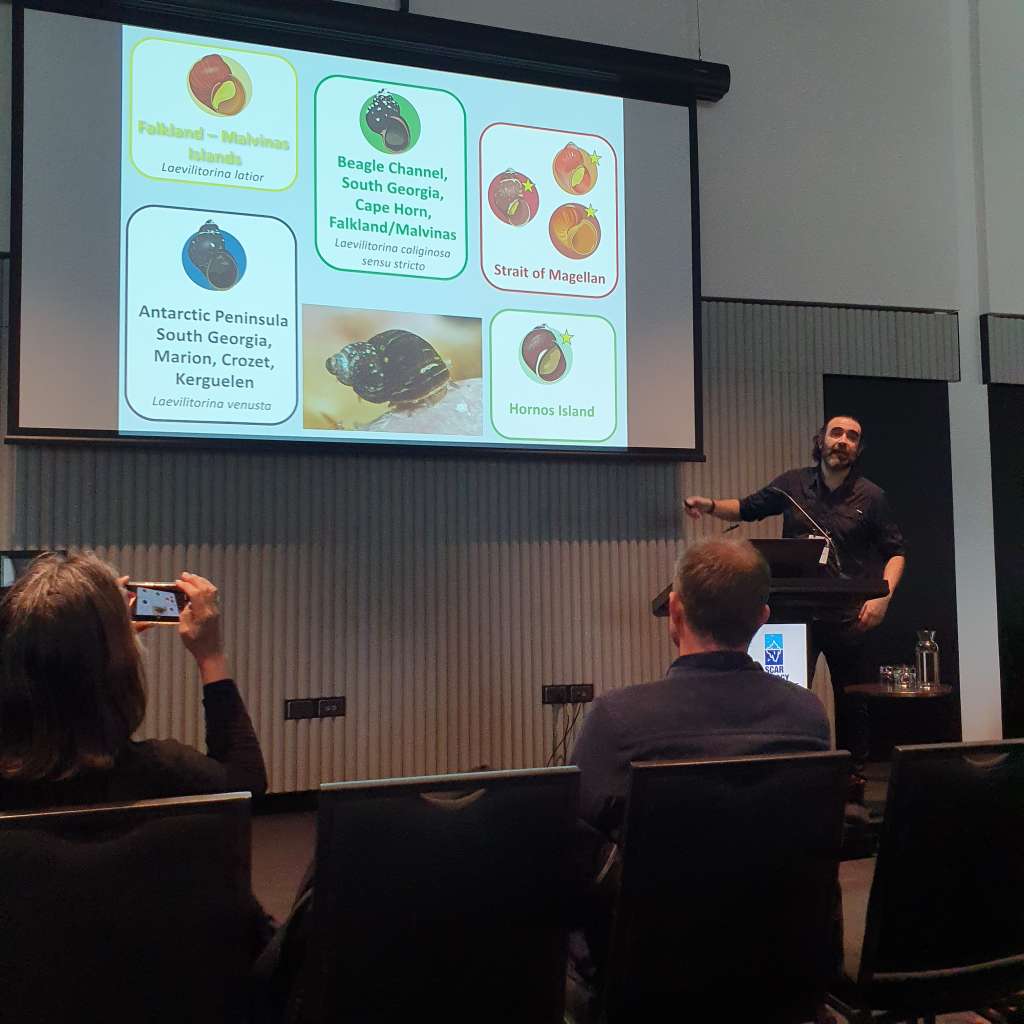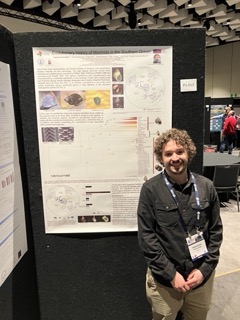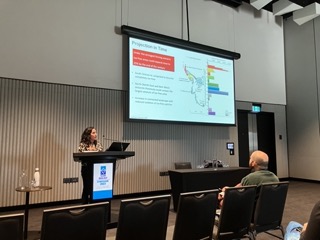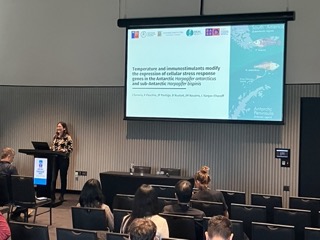Five researchers from Punta Arenas, Valdivia and Santiago from the Millennium Institute Biodiversity of Antarctic and Subantarctic ecosystems (BASE) and the Universities of Magallanes, University Austral of Chile, and University of Chile, presented their scientific advances at the prestigious SCAR Biology Symposium held until the 4 August in the city of Christchurch.

More than 300 researchers from 35 different countries, in the first SCAR face-to-face meeting in three years, they were exchanging advances and challenges in science in the city of Christchurch, New Zealand, until the 4 August 2023. The thirteenth version of the SCAR Biology Symposium presented a delegation from the Millennium Institute Biodiversity of Antarctic and Subantarctic ecosystems (BASE)
For the principal researcher of the BASE Millennium Institute, PhD. Claudio González-Wevar, the symposium is a key opportunity to present the latest results obtained from his Fondecyt 1210787 project, including new data on species from New Zealand, Antarctica and South America: “Among the most interesting results is that a species of Laevilitorina (Laevilitorina venusta) is distributed between Antarctica and Macquarie Island (Australia), making it one of the first examples of the same species found on both sides of the Polar Front”, he says.
The associate professor at the Institute of Marine and Limnological Sciences, Faculty of Sciences at the Universidad Austral de Chile, says his results suggest that “Laevilitorina venusta is a model species for physiological studies, as this lineage would have the ability to survive in Antarctic and sub-Antarctic environments. This is part of one of the project’s objectives, and Julia Saravia will develop her postdoctoral project in this area,” says González-Wevar.

On the other hand, the associate researcher of the BASE Millennium Institute and oceanographer PhD. Andrea Piñones, presented the interaction between high frequency physical processes, such as coastal circulation and the impact of the tide, in the generation of biological hotspots in the South Shetland Islands: “Understanding how dynamic oceanographic processes are or could be generating favorable places for Antarctic marine organisms helps us to describe their current state”, says the also researcher of COPAS Coastal and IDEAL Center.
Representing the Chilean chapter of the Association of Polar Early Career Scientist (APECS), Phd. Claudia Maturana, researcher at the BASE Millennium Institute, will present the main results of her postdoc, linked to the connectivity of different populations of a freshwater crustacean (Branchinecta gaini): “We need to understand what the effective dispersal capacity of organisms is in order to predict changes in distribution in the face of the possible effects of climate change,” she says.

Similarly, the doctoral researcher of the Millennium Institute BASE, CHIC and the GAIA Antarctic Research Center UMAG, Sebastian Rosenfeld, presented the results of his doctoral thesis focused on the global phylogeny of littorinid gastropods, research also conducted in the framework of his INACH project DG-10-22. Rosenfeld, is also Vice-President of ACPECS-Chile and researcher at the Universidad de Magallanes (UMAG), stresses the importance of communicating his research results: “I will show some of the new species we are describing, and also the scenarios we are proposing to explain the current diversity patterns of Laevilacunaria, Pellilitorina and Laevilitorina. In a context of climate change, it is very important to know in detail the biodiversity that currently inhabits Antarctic and Subantarctic environments,” he says.

Finally, the geneticist and researcher attached to the BASE Millennium Institute and Postdoctoral Fellow of the Austral University of Chile (UACh), Phd. Julia Saravia announced advances focused on two species of high-latitude fish: the notothenids Harpagifer bispinis (Diablito de los canales, sub-Antarctic), and Harpagifer antarcticus (Spiny Pillar) that inhabit Antarctica: “The increase in ocean temperatures due to global climate change combined with the intensification of human activity represents a great challenge for native fish of high latitudes”, says.
The XIII SCAR Biology Symposium took place from August 4, 2023 in New Zealand and brought together hundreds of researchers from all over the world, in matters of acclimatization, adaptation and resistance of Antarctic flora and fauna, ecosystem patterns and processes, molecular ecology, biogeography and biosafety among others. More information in https://www.confer.co.nz/scarbiology2023

SCAR (Scientific Committee on Antarctic Research), established in 1958, is an influential non-governmental organization composed of scientists from various disciplines. Its main objective is to promote, facilitate and coordinate worldwide scientific research in the Antarctic region. Adopting a collaborative approach, SCAR has become a fundamental pillar in advancing knowledge and understanding of the unique ecosystems and phenomena that characterize Antarctica.
Delegation of BASE Millennium Institute present at XIII SCAR Biology Symposium 2023, New Zealand (until august 4, 2023)
Complete program at: https://www.confer.co.nz/scarbiology2023/programme/
Dr. Claudio González-Wevar (Valdivia)
Principal investigator Millennium Institute Biodiversity of Antarctic and Subantarctic ecosystems (BASE) and Laboratory of Antarctic and Subanthartic Genomics and Molecular Ecology Laboratory (LAGEMAS). Academician of the Australian University of Chile (UACh) and researcher at the Center for Dynamic Research of Marine Ecosystems of High Latitudes (IDEAL).
Dr. Andrea Piñones (Valdivia)
Associate researcher Millennium Institute Biodiversity of Antarctic and Subantarctic ecosystems (BASE) and academic Universidad Austral de Chile and Institute of Marine and Limnological Sciences (UACh). Researcher of COPAS Coastal and Center for Dynamic Research of Marine Ecosystems of High Latitudes (IDEAL).
Dr. Claudia Maturana (Santiago)
Researcher attached to Millennium Institute Biodiversity of Antarctic and Subantarctic ecosystems (BASE) and Cape Horn International Center for Studies of Global Change and Biocultural Conservation, CHIC, (Cape Horn International Center). Member of the Board of Directors of the Association of Young Polar Researchers, APECS Chile, (Association of Polar Early Career Scientist, APECS).
Dr. Julia Saravia (Valdivia)
Researcher attached to Millennium Institute Biodiversity of Antarctic and Subantarctic ecosystems (BASE) and Postdoctoral fellow Universidad Austral de Chile (UACh). Researcher Laboratory of Antarctic and Subantarctic Genomics and Molecular Ecology (LAGEMAS) and Center for Dynamic Research of Marine Ecosystems of High Latitudes (IDEAL).
Sebastián Rosenfeld (Santiago-Punta Arenas)
Doctoral researcher Millennium Institute Biodiversity of Antarctic and Subantarctic ecosystems (BASE). Researcher University of Magallanes (UMAG), the GAIA Antarctic Research Center UMAG and the Cape Horn International Center for Studies of Global Change and Biocultural Conservation, CHIC, (Cape Horn International Center). Vice President of the Association of Polar Young Researchers, APECS Chile, (Association of Polar Early Career Scientist, APECS).
Main picture: (Names from left to right) PhD. Claudia Maturana, PhD. Sebastián Rosenfeld, PhD. Claudio González-Wevar, PhD. Andrea Piñones, and PhD. Julia Saravia
By: Carolina Gajardo and Nadia Politis
